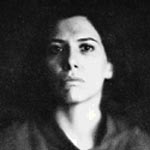Harvard's Barry Mazur on
one mathematical style:
"It’s the barest, most Beckett-like vocabulary
that incorporates the theory and nothing else."
Samuel Beckett, Quad (1981):

A Jungian on this six-line logo:
"They are the same six lines
that exist in the I Ching….
Now observe the square more closely:
four of the lines are of equal length,
the other two are longer….
For this reason symmetry
cannot be statically produced
and a dance results."
— Marie-Louise von Franz,
Number and Time (1970),
Northwestern U. Press
paperback, 1979, p. 108
A related logo from
Columbia University's
Department of Art History
and Archaeology:

Also from that department:

Meyer Schapiro Professor
of Modern Art and Theory:
"There is no painter in the West
who can be unaware of
the symbolic power
of the cruciform shape
and the Pandora's box
of spiritual reference
that is opened
once one uses it."
"In the garden of Adding
live Even and Odd…"
— The Midrash Jazz Quartet in
City of God, by E. L. Doctorow
THE GREEK CROSS
are the same length.
Here, for reference, is a Greek cross
within a nine-square grid:

Related religious meditation for
Doctorow's "Garden of Adding"…
Types of Greek cross
illustrated in Wikipedia
under "cross":

THE BAPTISMAL CROSS

a Greek cross, which is superimposed
on a Greek 'chi,' the first letter
of the Greek word for 'Christ.'
Since the number eight is symbolic
of rebirth or regeneration,
this cross is often used
as a baptismal cross.
Related material:

Fritz Leiber's "spider"
or "double cross" logo.
See Why Me? and
A Shot at Redemption.
Happy Orthodox Easter.
Jerusalem Cross
Comment by stephenhoy — Sunday, May 1, 2005 @ 3:59 pm
As a Jerusalem symbol, I prefer
this octagonal figure. For a
Christian version of the figure,
see Christian Snowflake.
Comment by m759&nextdate=2%2f24%2f2005+23%3a59%3a59.999" target="_blank — Sunday, May 1, 2005 @ 4:31 pm
Yeah, that snowflake is scary.
Comment by stephenhoy — Sunday, May 1, 2005 @ 11:04 pm